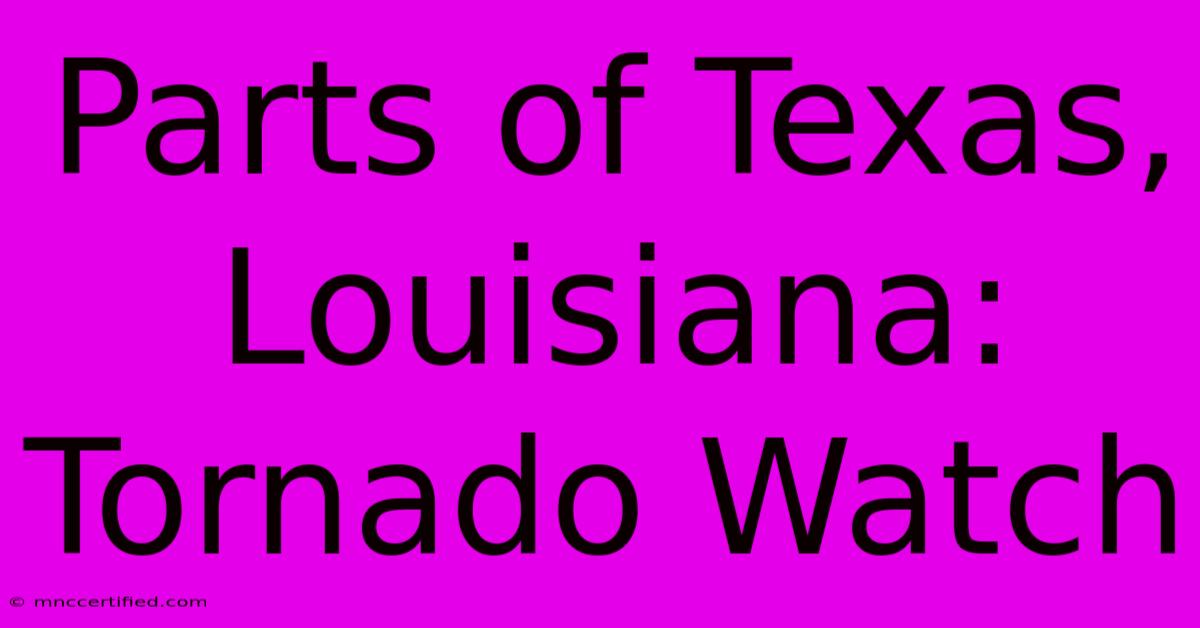Parts Of Texas, Louisiana: Tornado Watch

Table of Contents
Parts of Texas, Louisiana: Tornado Watch – Staying Safe During Severe Weather
Tornadoes are a serious threat to life and property, and understanding the risks, particularly in tornado-prone areas like parts of Texas and Louisiana, is crucial for safety. This article will cover the essentials of tornado watches and warnings, focusing on the specific concerns within these states. We'll explore preparedness strategies, safety procedures, and resources available to help you stay informed and protected.
Understanding Tornado Watches and Warnings
Before we delve into specific areas, it's vital to differentiate between a tornado watch and a tornado warning:
-
Tornado Watch: This means conditions are favorable for tornadoes to develop. Be vigilant, monitor weather reports closely, and prepare your emergency plan. A watch covers a larger area and can last several hours.
-
Tornado Warning: This is an urgent alert. A tornado has been sighted or indicated by weather radar. Take immediate action to seek shelter. Warnings are issued for smaller, more specific areas and typically last less than an hour.
Knowing the difference is paramount to your safety. Don't wait for a warning to begin your safety procedures. A watch is a signal to prepare.
Tornado-Prone Areas in Texas and Louisiana
Both Texas and Louisiana experience significant tornado activity, but the risk varies geographically. Certain areas are statistically more vulnerable:
Texas:
- North Texas: Areas like the Dallas-Fort Worth Metroplex, Wichita Falls, and surrounding counties experience a higher frequency of tornadoes. The region's geography and weather patterns contribute to this increased risk.
- Panhandle: The Texas Panhandle is also a region of concern, prone to severe thunderstorms and tornadoes, often associated with strong cold fronts.
- East Texas: While less frequent than in North Texas, severe weather, including tornadoes, can still occur in East Texas.
Louisiana:
- North Louisiana: The northern parishes of Louisiana, particularly those closer to the Texas border, are more susceptible to tornado activity.
- Central Louisiana: This region experiences a moderate risk, with tornadoes less frequent than in North Texas or North Louisiana but still a significant threat.
It's crucial to remember that tornadoes can occur anywhere, anytime. Even if your area isn't listed as high-risk, preparation is essential.
Preparing for a Tornado Watch in Texas and Louisiana
Having a plan is crucial. Here's a step-by-step guide to preparedness:
- Develop a Family Emergency Plan: Designate a safe room in your home—ideally an interior room on the lowest level, away from windows. Practice your plan regularly.
- Assemble an Emergency Kit: Include water, non-perishable food, flashlights, batteries, a first-aid kit, medications, and important documents.
- Monitor Weather Reports: Stay informed through NOAA Weather Radio, local news channels, and weather apps like the National Weather Service app.
- Sign up for Emergency Alerts: Register for emergency alerts from your local authorities to receive timely warnings directly to your phone.
- Know your surroundings: Familiarize yourself with local designated public shelters if needed.
Staying Safe During a Tornado Warning
When a tornado warning is issued, time is of the essence:
- Seek Immediate Shelter: Go to your designated safe room or shelter immediately. If you're in a vehicle, find a sturdy building or lie flat in a ditch, away from the vehicle.
- Stay Informed: Continue to monitor weather reports for updates.
- After the Tornado: Check for injuries, and report any damage to local authorities.
Resources for Staying Informed
- National Weather Service (NWS): The primary source for accurate weather information.
- NOAA Weather Radio: A reliable source of 24/7 weather alerts.
- Local News Channels: These provide up-to-the-minute reports and updates specific to your area.
Staying safe during tornado season in Texas and Louisiana requires vigilance and preparedness. By following these guidelines and utilizing the available resources, you can significantly reduce your risk and protect yourself and your loved ones. Remember, preparation is key to surviving severe weather events.

Thank you for visiting our website wich cover about Parts Of Texas, Louisiana: Tornado Watch. We hope the information provided has been useful to you. Feel free to contact us if you have any questions or need further assistance. See you next time and dont miss to bookmark.
Featured Posts
-
Wagatha Christie Vardys I M A Celeb Reaction
Nov 19, 2024
-
Investing In Portuguese Hotels A Guide
Nov 19, 2024
-
Watch Wagatha Christie Saga Coleen Rooney Free
Nov 19, 2024
-
Hiroad Insurance Customer Service
Nov 19, 2024
-
Kristie Mewis Sam Kerr Expecting
Nov 19, 2024